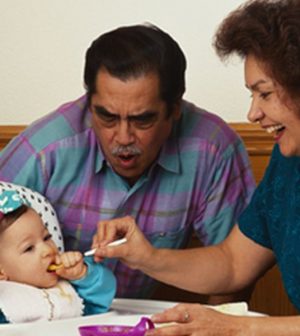- Could Your Grocery Store Meat Be Causing Recurring UTIs?
- Are You Making This Expensive Thermostat Error This Winter?
- Recognizing the Signs of Hypothyroidism
- 10 Strategies to Overcome Insomnia
- Could Artificial Sweeteners Be Aging the Brain Faster?
- Techniques for Soothing Your Nervous System
- Does the Water in Your House Smell Funny? Here’s Why
- Can a Daily Dose of Apple Cider Vinegar Actually Aid Weight Loss?
- 6 Health Beverages That Can Actually Spike Your Blood Sugar
- Treatment Options for Social Anxiety Disorder
How to Protect Your Child From Choking

Eating solid foods is a milestone in your child’s life. With the right precautions to reduce the risk of choking, you can make this a safe transition.
Teach children to sit up straight from the earliest age. Always supervise mealtime. A choking child may not make any noise to alert you from another room. Don’t rush kids, or let them put more than one piece of food in their mouth at a time. Take away food if they look drowsy or start to fall asleep.
Cook foods, especially hard fruits and vegetables like carrot sticks and apple slices, until very soft and easy to chew and swallow. Scrambled egg yolks and well-cooked whole-grain pasta pieces, peas and beans are good choices as are small tofu and very ripe pear and avocado cubes. Cut meat and poultry across the grain into tiny matchstick shapes.
Foods that are firm and round are choking hazards because they can block a child’s airway, the American Academy of Pediatrics warns. So skip hot dogs (even if cut up), nuts, large meat or cheese chunks, whole grapes, raw carrots and other hard raw fruit or vegetable pieces, hard or sticky candy like marshmallows, and popcorn until at least age 4.
Avoid giving young children stringy foods, such as celery, and packaged white bread products because these foods can glob up in baby’s mouth.
Keep in mind that much of this advice holds true until a child reaches age 7. Also, to be better prepared to handle a choking situation, consider learning basic first aid and CPR. These are good skills for everyone to know and for a variety of emergencies.
More information
The C.S. Mott Children’s Hospital in Michigan has more on how to prevent choking in young children.
Source: HealthDay
Copyright © 2026 HealthDay. All rights reserved.










